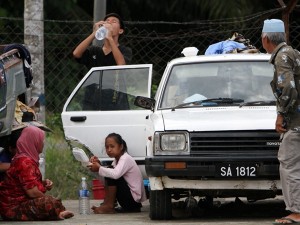
Evacuees choose to stay with their car at the evacuation center in Embara Budi complex, Felda Sahabat, Sabah. EDWIN BACASMAS/PHILIPPINE DAILY INQUIRER
DAVAO CITY, Philippines—Identifying the “Sulu intruders” from among the Sabah villagers remains difficult for Malaysian security forces, according to a ranking Malaysian military officer.
Maj. Gen. Zulkiflee Mazlan, director of the veteran affairs department of the Malaysian Armed Forces, told Malaysian journalists in Selangor state that many Sabahans, the Suluks and the Bajaus, were “descendents of the Sulu people and they have been living in Sabah for generations now.”
Zulkiflee issued the statement during a news conference in Petalingjaya, which state-run radio 24 has reported on, in the wake of the deaths of two children and the wounding of another boy by Malaysian security forces in Tanjung Batu in Lahad Datu on Sunday.
The children were inside a house, where alleged “terrorists” had run into and fired on approaching Malaysian security forces, who earlier trailed them, around 9:15 a.m., according to an earlier report by Malaysian Armed Forces Chief General Zulkifeli Zin.
It was the second encounter, in which, a minor was killed by Malaysian forces under Operasi Daulat.
On March 10, a teenage boy aged between 12 and 15, was also killed when Malaysian security forces fired on a bush in Sungai Bilis. Malaysian Police Inspector General Ismail Omar had said then the security personnel involved “saw movements in some bushes and opened fire,” adding that a man in his 30’s was also injured in the encounter.
“Reacting to the possibility that they were under attack by Sulu gunmen, the security team opened fire at the bushes,” he said, in justifying the fatal shooting, adding that it took place inside a red zone – where civilians were supposed to be off-limits.
Malaysians have not been very open about what they felt on the deaths of the children, especially after the filing of charges against a Sabah teacher for criticizing Malaysian security forces in their handling of the crisis.
But some Malaysian journalists – speaking on conditions of anonymity – had told the Philippine Daily Inquirer these bloody clashes proved that Malaysian security forces were edgy about the Sulu warriors – citing the massive deployment of soldiers and policemen even if the “intruders” only numbered about 200.
In the aftermath of Sunday’s “clash” in Tanjung Batu, which also resulted in the death of an adult male and female and the wounding of a soldier, Zulkifilee said since the “intruders” looked similar to the locals, distinguishing the locals and the intruders has been difficult.
In Davao City, Princess Jacel Kiram said Sunday’s arrest of Amirbahar Kiram, was proof that the Malaysian government was singling out people with Sulu ancestry as her cousin was never part of the “royal army.”
“He is not a commander,” Kiram said, describing Amirbahar as the son of his uncle, Sultan Bantilan Ismael Kiram II.
Kiram also said the “courage” of the “royal army” members who went to Sabah had appalled Malaysian authorities because even if they were not armed with more advanced and sophisticated weapons like the Malaysian security forces, they and their supporters have been able to put up a fight, “using available resources including farm tools.”
“They have less than 30 firearms that is why they are using barong (machete) and dos por dos (wood slabs),” Kiram said.
She also said the high death toll among the Sulu warriors was acceptable because “it is guns and bombs against barongs.”
Kiram also denied allegations that the “fighting forces” were promised payments but claimed their motivation was “the compounded rage of the people after decades of oppression and maltreatment in Sabah.
“Those who are fighting right now are not just the 200 men. That is why the Malaysian authorities are having a hard time in fighting because they are fighting against the people,” she said, even likening it to the Edsa Revolution.
“This is also people power,” Kiram said.
She also reiterated the family’s claim that Agbimuddin has been staying in Sabah, adding that “We were still able to talk to him this morning.”
With the massive arrests of people with Sulu ancestry – now numbering over 400 – Zulkifilee said security forces “have to be very careful in trying to determine who the real villagers are and who the intruders are.”
Zulkiflee said the government could conduct a massive registration of Malaysians on Sabah, regardless of how they became citizens.
“We have to isolate them,” he said.
In 1972, the Malaysian government – through the then Rajang Security Command (Rascom) – also conducted a massive list up of residents of Sarawak to isolate members of the communist Northern Kalimantan People’s Party (Paraku) from villagers.